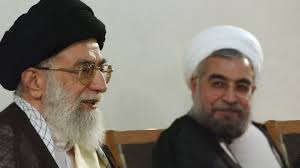Iran’s President, Hassan Rouhani, made clear on Sunday that Tehran will reject any restraints on its nuclear operations outside the international rules set by the industry watchdog.

“Any monitoring beyond those rules would be a precedent, against the interests of all developing countries,” Rouhani said.
Amano made a one-day visit to Tehran ahead of an August 25 deadline for Iran to answer decade-old allegations of past nuclear weapons research.
He held morning talks with Foreign Minister Mohammad Javad Zarif before meeting Rouhani, Iran’s official IRNA news agency reported. He later also met with Ali Akbar Salehi, head of the Iranian Atomic Energy Organization.
As part of the implementation of the interim deal it struck with world powers last November, Iran handed the IAEA documents in April and May relating to its past research, the first time it had done so in six years.
The interim deal was set to expire on July 20, but the sides recently committed to a four-month negotiating extension through November 24, after they were unable to reach a permanent deal by the original deadline.
Amano had said in a May report that Iran showed information to the agency that “simultaneous firing of EBW (Explosive Bridge Wire detonators) was tested for a civilian application”.
At a press conference on Sunday in Tehran, Amano broached the issue again, saying Iran had provided information and explanations to the IAEA on Tehran’s decision, in early 2000, to develop safer detonators.
“Iran has also provided information and explanations to the (IAEA) on its work post-2007 related to the application of EBWs in the oil and gas industry which is not inconsistent with specialized industry practices,” he added, according to AFP.
“The IAEA will need to consider all past outstanding issues, including EBWs, integrating all of them in a system and assessing the system as a whole.”
Amano in his talks with Rouhani on Sunday said he hoped “cooperation will continue in this more constructive atmosphere”.
“The agency’s aim is to move forward step by step to resolve the outstanding issues,” state television quoted him as saying. “It has no wish to drag out the process.”
Rouhani again insisted that Iran’s nuclear program was for entirely peaceful purposes only.
“Weapons of mass destruction have no place in (Iran’s) defence strategy,” he claimed.
He added that hoped that talks with the five permanent members of the UN Security Council plus Germany, known as P5+1, would “give the Iranian people and parliament the necessary confidence to continue discussions.”
“Iran is serious in its negotiations with the P5+1 group and wants nothing beyond its rights, especially concerning enrichment of uranium for peaceful aims.”
Rouhani said, however: “Iran’s ballistic capability is not negotiable at any level”, as the United States is seeking.
Iran seems to have toughened its positions in negotiations with the West. Iranian Supreme Leader, Ayatollah Ali Khamenei, recently said Iran “needs” 19 times more nuclear centrifuges than the amount being offered by world powers.
Iranian nuclear agency head Ali Akbar Salehi echoed Khamenei’s remarks a day later, saying Iran wants to greatly expand its uranium enrichment program despite Western fears that it could be used to make atomic arms.
Iran has previously insisted that it will never give up on what it sees as its right to uranium enrichment.
Source material can be found at this site.









